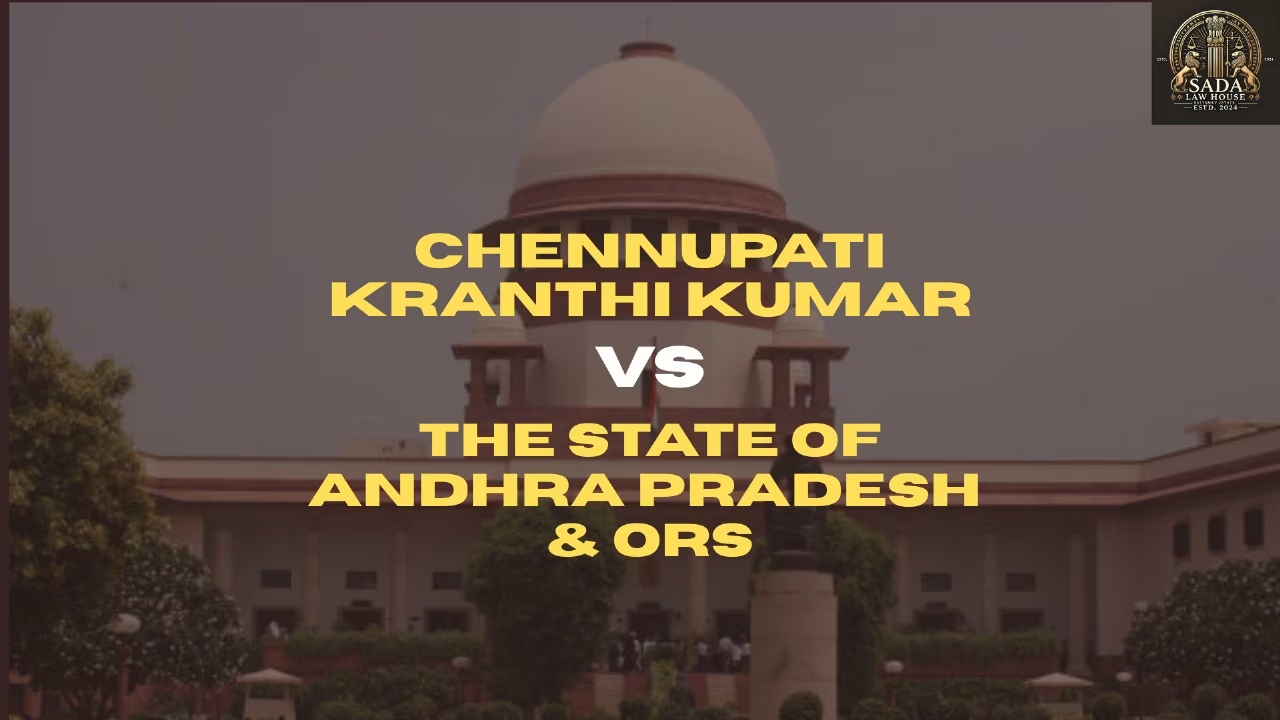Chennupati Kranthi Kumar vs. State of Andhra Pradesh & Ors. – Supreme Court Judgment (25 July 2023)
- REHA BHARGAV
- Sep 24, 2025

Read the Supreme Court’s ruling in Chennupati Kranthi Kumar vs. State of Andhra Pradesh & Ors. (2023), where the Court set aside unlawful conditions on passport submission in a dowry harassment case. Explore the case facts, issues, and the final judgment.
Introduction
On 25 July 2023, the Supreme Court of India delivered an important judgment in the case of Chennupati Kranthi Kumar vs. State of Andhra Pradesh & Ors. The dispute arose out of a matrimonial conflict, where the appellant’s wife (4th respondent) lodged a criminal complaint under Section 498A, Section 403, and Section 406 of the Indian Penal Code, along with Sections 3 & 4 of the Dowry Prohibition Act, 1961.
During the investigation, the police compelled the appellant to submit his passport, which was forwarded to the Regional Passport Office. The matter eventually reached the Supreme Court after the Andhra Pradesh High Court imposed conditions on the return of his passport that the appellant challenged.
Facts of the Case
Parties Involved
The appellant, Chennupati Kranthi Kumar, is the husband (Accused No. 1) and employed in the USA.
The 4th respondent is his wife, who filed a criminal complaint against him.
Criminal Proceedings
The wife’s complaint invoked:
Sections 498A, 403, and 406 of IPC.
Sections 3 & 4 of the Dowry Prohibition Act, 1961.
Passport Seizure
Police, under Section 91 of CrPC, directed the appellant to submit his passport.
The passport was forwarded to the Regional Passport Office in Hyderabad.
On 19 January 2021, the office issued a notice alleging that the appellant was in possession of his wife’s passport.
The appellant denied the claim and clarified that his minor son’s passport was lost in July 2021, for which reissue proceedings were already initiated.
Request for Passport Return
The appellant applied before the Magistrate for the return of his passport to continue his employment in the USA.
The Magistrate rejected the request on 14 June 2022.
High Court’s Order
The appellant approached the Andhra Pradesh High Court under Section 482 CrPC.
The High Court allowed the return of his passport but imposed three conditions:
Deposit of ₹10 lakhs in Fixed Deposit in the wife’s name.
Submission of original passports of wife and minor son.
An affidavit undertaking to return to India within six months for trial.
Appeal to Supreme Court
The appellant challenged the second condition (submission of wife’s and son’s passports).
He did not oppose the ₹10 lakh deposit requirement.
Issue of the Case
Were the conditions imposed by the Andhra Pradesh High Court—particularly requiring the appellant to submit the passports of his wife and minor son—legally valid for the release of his own passport?
Judgment
1. Illegal Retention of Passport
The Supreme Court observed that:
The appellant’s passport was neither seized under Section 102 CrPC nor impounded under Section 10 of the Passports Act, 1967.
Its continued retention by the Regional Passport Office was therefore unauthorized and illegal.
2. High Court’s Conditions Partially Set Aside
The requirement to submit the wife’s and minor son’s passports was declared unlawful and unsustainable.
The Court clarified that the appellant was entitled to the return of his passport without such conditions.
3. Deposit Condition Upheld
The condition requiring the appellant to deposit ₹10 lakhs in the wife’s name was upheld to ensure his return for trial.
4. Relief to Wife
The wife was allowed to apply for a fresh or reissued passport with the Regional Passport Office, based on a police report of loss.
The appellant was directed to cooperate by providing necessary documents.
5. Final Direction
The appeal was partly allowed.
No order as to costs was passed.
Conclusion
The Supreme Court ruled that the High Court erred in directing the appellant to surrender the passports of his wife and minor son, as such a condition lacked legal basis. However, the requirement to deposit ₹10 lakhs was upheld to secure his presence for trial.
This judgment highlights the Court’s stand on personal liberty, due process, and the lawful handling of passports under the Passports Act. It also ensures balance by protecting the wife’s rights while enabling the appellant to continue his overseas employment.
Case Laws






